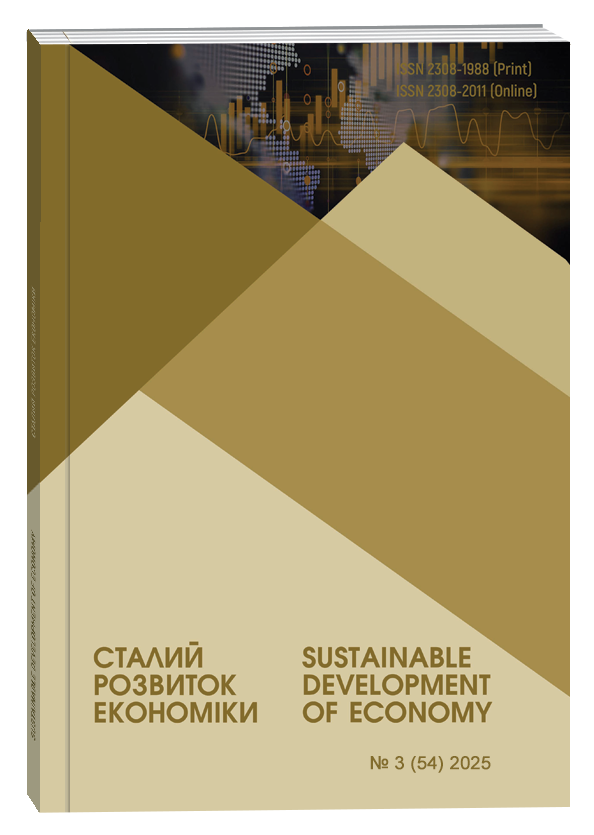SUSTAINABLE DEVELOPMENT IN THE CONTEXT OF WARTIME: PROBLEMS AND WAYS OF ENSURING IT
Abstract
The article explores the conceptual and practical foundations of sustainable development within the complex and volatile framework of wartime realities. It critically analyzes how armed conflicts disrupt the pursuit of Sustainable Development Goals (SDGs) and create multidimensional threats to human well-being, environmental health, and economic systems. Particular attention is devoted to the wide-ranging consequences of war, including but not limited to economic destabilization, collapse of social institutions, displacement of populations, demographic imbalances, destruction of ecosystems, and long-term environmental degradation. The study underscores that warfare not only halts development progress but often reverses hard-won gains in poverty reduction, education, health care, and institutional resilience. Key barriers to sustainability in wartime settings are examined in detail, such as the deliberate or collateral destruction of critical infrastructure, limited access to water, energy, and healthcare services, reduced governance capacity, and the redirection of national budgets from development priorities toward defense spending. The paper argues that conventional sustainable development models—designed for peacetime conditions—are ill-equipped to address the scale and urgency of challenges posed by active conflict zones. In this regard, the authors advocate for a paradigm shift towards resilience-focused and conflict-sensitive approaches. Emphasis is placed on the integration of emergency response mechanisms with long-term recovery strategies that align with sustainability principles. The article stresses the necessity of building adaptive governance systems that are capable of withstanding shocks, managing risks, and fostering inclusive, participatory planning even amidst instability. The role of international cooperation, humanitarian aid, and institutional solidarity is explored as a crucial element in sustaining momentum toward global development goals in times of war. Additionally, the paper highlights best practices from international experience and lessons learned from recent conflicts that can inform more effective policy responses. Based on a comprehensive analysis, the authors propose a set of practical recommendations aimed at enhancing the viability of sustainable development strategies in countries affected by armed conflict. These include strengthening institutional frameworks, promoting local capacity-building, ensuring environmental safeguards in reconstruction efforts, and fostering social cohesion. The findings presented in this study offer a valuable basis for policymakers, researchers, and practitioners engaged in post-conflict recovery and sustainable governance, and point to the urgent need for more flexible and context-specific development models that can operate effectively under conditions of protracted crisis.
References
Smith J. Post-Conflict Reconstruction and the Environment: Policy Gaps and Opportunities. Journal of Environmental Policy and Planning. 2020. Vol. 22, № 1. рр. 55–72.
Johnson A. Sustainable Development Goals under Armed Conflict: A Reality Check. Development in Practice. 2022. Vol. 32, № 4. рр. 478–489.
Kovalenko O., Shevchenko M., Ivanov V. War and environmental security: Challenges for Ukraine’s sustainable development. Environmental Policy Review. 2021. Vol. 27, № 2. рр. 132–149.
Lee S., Martinez R. Armed conflicts and biodiversity loss: A global assessment. Environmental Science & Policy. 2023. Vol. 150. рр. 20–35.
Anderson M., Brown D. Resilience and sustainable development in conflict zones: Integrating humanitarian aid and long-term recovery. Journal of Peacebuilding & Development. 2019. Vol. 14, № 3. рр. 45–59.
Nguyen P. Strategies for adaptive governance in war-affected regions. Global Environmental Politics. 2024. Vol. 24, № 1. P. 78–95.
UNDP. The impact of the war in Ukraine on sustainable development in Africa. 2022. URL: https://www.undp.org/africa/publications/impact-war-ukraine-sustainable-development-africa (дата звернення: 10.06.2025).
World Bank. Supporting sustainable recovery in conflict-affected countries. 2023. URL: https://www.worldbank.org/en/topic/conflict (дата звернення: 10.06.2025).
Meaza H., et al. Managing the environmental impacts of war: What can be learned from conflict-vulnerable communities. Science of the Total Environment. 2024. Vol. 898. Article 166665. DOI: 10.1016/j.scitotenv.2024.166665.
The Guardian. War, deforestation, flooding: in Afghanistan they are all linked. The Guardian. 2024. URL: https://www.theguardian.com/world/2024/sep/14/afghanistan-war-deforestation-flooding-climate-change (дата звернення: 10.06.2025).


